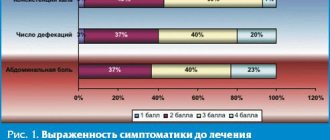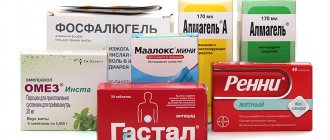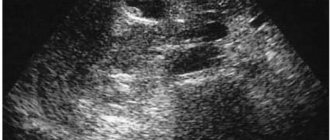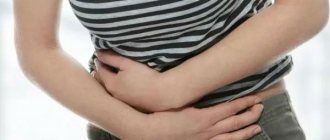Carminative drugs (antiflatulents) are a group of drugs that prevent excessive gas formation in the intestines and are used for the prevention and treatment of flatulence.
Flatulence is a common symptom of functional and organic digestive disorders, which is accompanied by a feeling of bloating, cramping pain and/or cramping in the abdominal area (colic), as well as excessive release of gas.
Flatulence can act as one of the symptoms of a wide range of diseases of the gastrointestinal tract: colitis, irritable bowel syndrome, intestinal dysbiosis, or be an independent manifestation of temporary digestive disorders.
Flatulence often occurs when eating large quantities of foods rich in indigestible fiber (white sprouts, cauliflower, Brussels sprouts, broccoli, kohlrabi, celery), legumes (beans, lentils, peas), as well as fermented foods and drinks (bread, beer , kvass).
Flatulence necessarily accompanies the consumption of dairy products (milk, yogurt, kefir, sour cream, cream, cheese, cottage cheese) by patients with lactase deficiency - the enzyme that breaks down lactose, which is rich in dairy products.
In addition, flatulence is usually observed in newborns and children up to 3-6 months due to the digestive system not yet properly functioning.
Flatulence is often observed in pregnant women, especially in late stages of pregnancy - from 6 months and above, due to the pressure of the enlarged uterus with the fetus on the organs of the gastrointestinal tract.
Effective drugs against flatulence
Treatment of disorders of the stomach and intestines is carried out using various groups of medications, as well as mandatory nutritional correction. To restore digestion, carminatives and enzyme agents, enterosorbents, prokinetics, prebiotics and probiotics can be used. If gas formation is accompanied by pain, antispasmodics are additionally prescribed.
| Medicine | Active substance | Manufacturer | average cost |
| Espumisan | Simethicone | Berlin-Chemie AG/Menarini Pharma HmbX (Germany) | 270-470 rubles |
| Pepphys | Amylase, papain, simethicone | Ranbaxy (India) | 420-480 rubles |
| Antareit | Simethicone, magaldrate | JSC Valenta Pharm, Russia | 190-320 rubles |
| Meteospasmil | Simethicone | Laboratoires Mayoly-Spindler (France) | 440-470 rubles |
| Imodium | Loperamide | Johnson & Johnson (Russia) | 160-250 rubles |
| Pepsan-R | Dimethicone | Laboratoires Rosa-Phytopharma (France) | 400-430 rubles |
| Holenzym | Dried bile, dried pancreas | RUE "Belmedpreparaty", Republic of Belarus | 185-245 rubles |
| Motilium | Domperidone | Johnson & Johnson (Russia) | 570-700 rubles |
| Linex | Lebenin | Sandoz d.d., Verovshkova 57, 1000 Ljubljana, Slovenia | 320-620 rubles |
| Smecta | Dioctahedral smectite | Bofur Ipsen Industry. 28100 France, Dreux, Rue et Virton | 125-150 rubles |
| Festal | Pancreatin | Aventis Pharma International (France) | 220-300 rubles |
| Cerucal | Metoclopramide | Teva (Israel) | 120-220 rubles |
In order to quickly get rid of flatulence, constipation and digestive disorders, it is best to take medications from several groups. But any medications should only be prescribed by a doctor, taking into account existing contraindications and age restrictions.
The best carminatives (defoamers)
Medicines from the group of defoamers reduce the volume of gases in the small intestine due to the destruction of air bubbles during absorption of the active substance. It is quickly absorbed by the mucous tissues of the gastrointestinal tract and excreted naturally.
The best cheap carminatives:
- Espumisan;
- Pepsan-R;
- Simikol.
Espumisan is a carminative drug based on simethicone, produced in the form of liquid syrup and tablets. The medicine can be taken by adults and children from birth. The medication is recommended for use for bloating, gas formation and various poisonings. For flatulence, you need to take 2 capsules 3-4 times a day.
Espumisan does not cause side effects.
Pepsan-R - the main active ingredient is dimethicone, which normalizes the production of stomach acid and relieves bloating. Against flatulence, it is recommended to take 1 tablet three times a day.
Simicol is a drug with a combined composition, which includes dimethicone and simethicone. The medication is taken 30-50 drops after meals. It effectively eliminates gas tension in the small intestine, removing bubbles and removing them from the body.
Their main advantage is that carminative drugs not only change the surface tension of the blisters with their subsequent destruction, but also prevent the formation of new blisters.
Prevention of flatulence
Of course, in order not to provoke the formation of excess gases in the body, you can avoid eating many foods. But for most people, this is not an option, and it is unrealistic.
You can do it much simpler. Drink the infusions and decoctions that we recommended above, not only at the moment when you already have unpleasant symptoms or pain, but also as a preventive measure. All of them do not taste unpleasant and do not cause disgust. And the effect of use will be obvious. The fact is that natural components help cope with ailments and additionally saturate the body with vitamins and beneficial elements.
We think we have answered the question of what a carminative means and what its principle of action is.
Application of enterosorbents
Enterosorbent is one of the most effective drugs against seething in the stomach, a feeling of heaviness, including after eating food, as well as the accumulation of gases. These pharmacological agents cleanse the digestive organs of pathogenic microorganisms and restore healthy microflora.
Effective and affordable enterosorbents:
- Activated carbon;
- White coal;
- Polysorb;
- Lactofiltrum;
- Filtrum.
Activated carbon - prescribed for bloating, dyspepsia, and various intoxications. The medicine quickly eliminates unpleasant symptoms and removes harmful toxins from the body. The dosage of activated carbon is calculated depending on the person’s weight - at least 1 tablet for every 10 kg of weight.
Activated carbon should not be taken for stomach and duodenal ulcers, as well as internal bleeding.
White coal is considered no less effective. This enterosorbent is used in the treatment of food, chemical and alcohol intoxication, helminthiasis, intestinal infections and stool disorders.
Polysorb is available in powder form for the preparation of a suspension, approved for use from 1 year of age. Enterosorbent does not worsen the intestinal microflora and does not cause constipation. It is recommended to take the medicine three times a day, the dosage of the suspension is calculated depending on the person’s weight.
Gastrointestinal motility stimulants
A New Year's diet, replete with fatty, spicy and salty foods, can increase the production of the neuropeptide hormone cholecystokinin [4], which inhibits the motor-evacuation function of the stomach, which is manifested by a feeling of fullness in the stomach, epigastric pain, nausea, and in severe cases, vomiting. To relieve these manifestations, motor stimulants, or prokinetics, are used.
Metoclopramide, known to several generations of doctors and patients, has prokinetic activity.
As an antagonist of dopamine and serotonin receptors, metoclopramide stimulates the motility of the upper gastrointestinal tract, improves the amplitude of gastric contractions, relaxes the pyloric sphincter and duodenal bulb. In addition, metoclopramide has an antiemetic effect, which is due to the blockade of central and peripheral D2-dopamine receptors. However, along with proven effectiveness, the widespread use of metoclopramide is limited by frequent side effects (almost 30% of cases), including headache, drowsiness, hormonal disorders and other adverse events [5].
A modern and well-tolerated alternative to metoclopramide is the highly selective peripheral dopamine D2 receptor blocker domperidone.
By inhibiting dopamine receptors, the drug increases the release of acetylcholine, which provides an antiemetic effect. In addition, domperidone has a gastrokinetic effect, increases the duration of antral and duodenal contractions, accelerates gastric emptying, and also increases the pressure of the sphincter of the lower esophagus. Maximum absorption of the drug occurs when it is used before meals, that is, in our case, before a gala dinner. Domperidone belongs to the over-the-counter group of drugs and is used to treat adults and children, including newborns.
Along with domperidone, itopride is used as a stimulant of gastrointestinal motility.
It has a dual mechanism of action: the drug interacts with D2-dopamine receptors and also inhibits acetylcholinesterase, which leads to activation of propulsive gastric motility. Itopride accelerates the transit of food through the stomach and ensures faster emptying. Unlike domperidone drugs, itopride is available only with a doctor's prescription.
Effective enzyme preparations
Enzyme preparations are most often used in the most severe cases, with serious disturbances in the functioning of the gastrointestinal tract. Enzymes have a complex effect - they improve food digestion, tidy up the intestinal microflora, reduce gas formation and stimulate the pancreas.
Effective enzyme preparations include:
- Pancreatin;
- Abomin;
- Festal.
Pancreatin is one of the most effective and cheapest enzyme preparations. It effectively cleanses the digestive system from pathogenic bacteria and their metabolic products, and increases the production of beneficial gastric enzymes. Pancreatin effectively removes food debris and accumulated feces from the stomach and intestines, eliminating the feeling of heaviness and bloating.
Abomin is an enzyme product based on plant components. The medicine is intended for long-term use. The average duration of treatment is 4-8 weeks. Abomin should be taken 1 tablet three times a day.
Festal - accelerates the breakdown of food, stimulates the pancreas and accelerates the work of enzymes necessary for the full functioning of the gastrointestinal tract. Festal is recommended to be taken one tablet up to 3-4 times a day.
Enzymes - cures for bloating and gas
Enzyme deficiency, manifested by pain, epigastric discomfort, bloating, flatulence and belching, requires the use of enzyme replacement drugs.
The basis of therapy for pancreatic insufficiency is pancreatin preparations [1].
They contain pancreatic enzymes: amylase, lipase and trypsin. Pancreatin provides a sufficient range of digestive activity and relieves signs of exocrine pancreatic insufficiency, including nausea, rumbling in the abdomen, flatulence and other symptoms [1].
The dose of drugs depends on the degree of enzyme deficiency and the content of lipase in the drug. In addition, the fat content in the diet should be taken into account: the higher it is, the higher the dose of the drug is required. Before the main meal, the dose of enzymes can vary from 25,000 to 80,000 units of lipase. Pancreatin is contraindicated in pancreatitis and intestinal obstruction.
Complex enzymes with bile extract are also indicated for overeating, for example, a combination of pancreatin, hemicellulase and bile components [2].
Bile has proteolytic, amylolytic and lipolytic effects, promotes rapid and complete digestion of food, eliminates the feeling of heaviness and fullness in the stomach, flatulence, shortness of breath due to the accumulation of gases in the intestines, and diarrhea [3]. Bile extract has a choleretic effect, promotes emulsification of fats and improves their absorption, increasing lipase activity. The third component of the combination, hemicellulase , helps break down plant fiber [3].
Complex enzyme preparations containing bile components are contraindicated for cholelithiasis, obstructive jaundice, acute pancreatitis and exacerbation of chronic pancreatitis, as well as for liver failure [3].
Let us add that enzyme preparations are prescribed before or during the festive dinner.
Use of prokinetics
Prokinetics are medications that improve the functioning of the gastrointestinal tract and reduce gas production. Prokinetics are most effective in identifying putrefactive microflora in the small intestine. They inhibit the fermentation process, accompanied by an increase in the volume of gas bubbles.
Popular prokinetics:
- Motilium;
- Eglonyl;
- Duspatalin.
Motilium is one of the most common and effective prokinetics that normalizes intestinal microflora. The drug quickly eliminates bloating, heaviness and other unpleasant symptoms, improves overall well-being. Motilium removes excess gases naturally.
Duspatalin is a combination drug that combines prokinetic and antispasmodic properties. The medicine should be taken morning and evening, half an hour before meals. Duspatalin not only relieves flatulence, but also relieves painful abdominal cramps.
Duspatalin can change the intestinal and gastric microflora, so this prokinetic agent should not be taken for a long time.
Eglonil effectively restores the functioning of the digestive system, helping to solve the problem of bloating. Available in the form of capsules and solution for intravenous or intramuscular administration. The form of the medication and dosage are selected individually depending on the severity of the symptoms.
Treatment with probiotics and prebiotics
Probiotics and prebiotics are medications that act directly on the intestinal microflora, destroy pathogenic microorganisms and restore the growth of beneficial bacteria.
These pharmacological agents accelerate the regeneration of the gastrointestinal mucosa after poisoning, long-term use of antibiotics or illness. These include:
- Hilak Forte;
- Linux;
- Portalak.
Hilak Forte is a medicine that has a safe composition and a rapid therapeutic effect. The medicine begins to act within 5-10 minutes after administration, eliminating heaviness, bloating and other unpleasant symptoms. Hilak Forte is recommended to be taken at least 3 times a day.
Linex is one of the best probiotics for restoring beneficial intestinal microflora. The drug is approved for use from birth, therefore it is often used for stomach colic in newborns.
Portalac is a lactulose-based drug that helps quickly restore healthy intestinal microflora and solve the problem of constipation. The medicine has a minimal number of contraindications and is approved for use during pregnancy, breastfeeding, and for the treatment of newborns.
Natural carminatives
How often do we forget that we are surrounded by countless medicinal herbs. They can help everyone cope with various ailments. For each disease, in addition to the medicine sold in the pharmacy, you can choose a natural analogue, which often has a much milder effect. And as we mentioned above, for children such treatment in many situations is better than the use of chemicals, which, moreover, may also be of poor quality.
Antibiotics and antispasmodics
Antibiotics are prescribed in cases where digestive disorders are associated with infectious processes in the gastrointestinal tract. In such cases, bloating and flatulence are accompanied by other unpleasant symptoms - nausea, vomiting, severe diarrhea, and increased body temperature.
The most commonly used antibiotics are:
- Rifaximin;
- Alpha Normix;
- Furazolidone.
These drugs are broad-spectrum antibiotics. They destroy pathogenic microorganisms that cause gas and other digestive problems.
The duration of antibacterial therapy in most cases does not exceed 3-7 days.
In cases where bloating is accompanied by painful cramps, antispasmodics are used. They relieve discomfort and eliminate smooth muscle spasms. The most effective drugs include Meteospasmil, Drotaverine, Duspatalin.
Antispasmodics are indicated for use in cases of intestinal motility disorders, increased formation of gases, painful constipation, and colitis. Such medications should not be taken by children under 14 years of age, as well as by women during pregnancy and breastfeeding.
Antisecretory drugs
Antisecretory drugs ensure the full functioning of the pancreas, and therefore are included in the complex treatment of many diseases of the gastrointestinal tract. Antisecretory drugs effectively eliminate pain, reduce the volume of gases, acting directly on the cause of dyspepsia.
The best antisecretory drugs for bloating:
- Omeprazole;
- Atropine Sulfate;
- Famotidine.
Omeprazole effectively restores inflamed mucous membranes of the stomach and intestines, improves the functioning of the digestive organs, relieves flatulence and a feeling of heaviness. The medicine acts on the production of stomach acid, normalizing its level. For treatment you need to take 1 tablet once a day. Omeprazole is prohibited for use by children under 12 years of age and women during pregnancy.
Atropine Sulfate is available in the form of a solution for intramuscular or intravenous injections, which are administered to the patient twice a day. The break between injections should be at least 7-9 hours.
Famotidine is an antisecretory agent that reduces the production of hydrochloric acid and improves the general well-being of a person suffering from digestive disorders. Improvement occurs within 24 hours after taking the tablet.
Antacid medications
The action of antacid medications is aimed at reducing the production of hydrochloric acid and restoring full intestinal motility. By reducing the level of gastric acidity, the restoration of the inflamed mucous membrane of the digestive organs is accelerated, the volume of gas bubbles in the small intestine is reduced, heartburn and a feeling of heaviness disappear.
Common antacid medications:
- Maalox;
- Almagel Neo;
- Almagel A.
Maalox - reduces the production of hydrochloric acid and the volume of gas in the cavity of the small intestine. The medicine has a soft, enveloping effect on the damaged mucosa, accelerating its recovery and protecting it from the aggressive effects of external factors.
Almagel Neo is an antacid with an adsorbing and enveloping effect. Adult patients are recommended to take Almagel Neo at least 4 times a day, 50-60 minutes after meals. For children, the dosage of the medicine is calculated individually.
Almagel A - gently envelops the stomach and intestinal walls, protecting them from harmful factors. It is distinguished by its rapid action - improvement in the condition is observed within 4-5 minutes after taking the medicine.
List of drugs
For adults
"Espumizan" is a drug with an active ingredient - simethicone. This chemical compound is capable of destroying the gas bubbles that form in the intestinal suspension and mucus, and evacuating them along with the feces. Preparations based on simethicone are not absorbed by the body and are excreted physiologically unchanged. "Espumizan" eliminates the symptoms of bloating and intestinal colic.
Medical products (drugs, medicines, vitamins, dietary supplements) are mentioned for informational purposes only. We strongly do not recommend using them without a doctor's prescription. We recommend reading: “Why can’t you take medications without a doctor’s prescription?”
The drug is recommended in capsule form (25 and 50 pieces in one box), or in the form of drops (30 ml bottle). Espumisan should be taken with meals and before going to bed. Can be taken after main meals. Prescribe 2 capsules or 50 drops every 4-5 hours. The drug is washed down with boiled water at room temperature, at least 100 ml. Treatment is continued until the symptoms of abdominal discomfort cease.
When preparing for diagnostic procedures (radiography, sonography, CT and MRI, endoscopic examinations of the digestive tract) or after abdominal operations, Espumisan is used for prophylactic purposes. Intestinal gases should not interfere with visual examination during examinations. After operations on the abdominal area, flatulence may also develop. This is due to electrolyte disturbances as a result of the administration of anesthesia and mechanical effects on the sensitive intestines, or with carbon dioxide pumped into the abdominal cavity (during laparoscopy). The drug is prescribed in advance - 24 hours before the start of the study or immediately after surgery. We recommend 2 capsules or 50 drops 3 times a day. On the morning of the examination, take additionally in the same dosage.
In case of poisoning with detergents with the formation of foam, Espumisan is used as an antifoam. Take 10-20 capsules of the drug at a time. The dose is determined by the severity of the patient's intoxication.
"Meteospasmil" is a combination drug based on simethicone and alverine. It has a pronounced antispasmodic and carminative effect. The drug reduces the intensity of gas formation in the intestines and forms an enveloping film on the surface of the mucous membrane of the digestive tract. "Meteospasmil" helps to relax the intestinal muscles and the extinction of overly active peristalsis. Consequently, colicky abdominal pain, rumbling and a feeling of fullness due to flatulence disappear. The drug also helps with certain dyspeptic disorders (nausea, diarrhea or acute stool retention).
Be sure to read:
Stool color in newborns: where is the norm and where is the pathology? "Meteospasmil" is used in capsules (30 pieces per box). For the drug to work effectively, it is prescribed before meals, 1 capsule 3 times a day. Before diagnostic examinations of the digestive organs, Meteospasmil is used the day before and in the morning on the day of the medical procedure. The conditions for taking the drug are the same.
"Disflatil" is a non-toxic drug with simethicone. Helps cope with flatulence and belching due to excessive swallowing of air (aerophagia) during rapid chewing of food. The drug is available in drops packaged in 30 ml glass bottles. "Disflatil" is used after meals and shortly before bedtime. The effective dose is 50 drops 3 times a day. Wash down with a small volume of boiled water (100 ml) at room temperature.
Before diagnostic studies of the abdominal organs, the drug is prescribed for 2 days before the examination, as well as in the morning before the start of the procedure.
"Sab Simplex" is a carminative based on simethicone. Available in glass bottles with a viscous emulsion. Volume – 30 ml. The drug is taken with food and at night. You can do it right after eating. Sub Simplex is recommended for adults, 30-45 drops 4-5 times a day.
To prepare for abdominal radiography, the drug is taken the night before bedtime in a volume of 15-30 ml. Before an ultrasound scan of the digestive tract or pelvis, Sub Simplex is prescribed in the evening. In the morning, take the drug again. The required dose of emulsion is 15 ml. Before endoscopic procedures (FGDS, colonoscopy, sigmoidoscopy), the drug is used shortly before the start of the study. Recommended volume: 5 ml. The doctor additionally administers a small dose of the drug through an endoscope.
In case of intoxication with detergents, take 5 ml of emulsion at a time. In severe conditions, the dose can be increased.
"Kuplaton" is a drug based on dimethicone. Has a surface-active effect. Reduces the tension of gas bubbles in the intestines, promotes their fusion and removal from the body. "Kuplaton" is produced in capsules (30, 100 pieces per box) and in drops (30 ml glass bottle). The drug reduces the manifestations of flatulence that occur due to fermentation processes in the intestines and aerophagia. Kuplaton also combats the feeling of fullness in the abdomen, rumbling and spastic pain. Facilitates the passage of gases.
The drug is recommended to be used before eating. Effective dosage – 1 capsule or 5 drops 4 times a day. Before diagnostic studies of the digestive organs, the drug is recommended to be taken for 2-3 days. Additional appointment - in the morning, shortly before the start of the procedure. The required dose is 1 capsule or 12 drops 3 times a day.
Pepphys is a digestive medicine containing simethicone. It contains plant enzymes - papain and fungal diastase. "Pepfiz" normalizes the processes of digestion and absorption of nutrients, reduces excess gas production by the intestines, and improves motility. The drug also stimulates appetite and the production of gastric juice.
"Pepfiz" is produced in effervescent tablets (2, 4 or 14 pieces in a cardboard box). The dosage form is dissolved in 100-120 ml of drinking water at room temperature. This chemical reaction releases compounds (Na and K citrates) with an antacid effect. They reduce the production of hydrochloric acid by the stomach and relieve heartburn.
The drug is prescribed after meals. The effective dose is 1 tablet 3 times a day. The duration of treatment is determined by the doctor. At the preparatory stage, before radiography or ultrasound of the abdominal area, Pepphys is used in a standard dose in the morning and evening for 2 days.
"Almagel NEO" is an antacid drug with simethicone. It has a carminative and enveloping effect. Reduces the hyperproduction of hydrochloric acid by the stomach due to chemical compounds - Mg and Al hydroxide. The drug is effective against putrefactive fermentation processes in the intestines (eliminates excess gas formation, bloating and abdominal cramps). "Almagel NEO" copes with heartburn and pain in the epigastric region due to reflux and exacerbation of gastritis.
The drug is produced in the form of a suspension in glass bottles of 170 ml and in bags (10 or 20 pieces per box). The medicine is used an hour after meals and before bedtime, 4 times a day. The effective dose is 2 scoops or 1 sachet. The drug should not be taken with water for 30 minutes.








